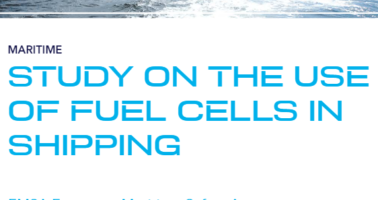Fuel cells are a promising technology in the context of the sustainability of clean energy and alternative fuels for shipping. There are currently a number of specific advancements on fuel cells, and research and pilot projects are being evaluated which have revealed great potential for further large-scale application. The study of the European Maritime Safety Agency (EMSA) on the use of fuel cells in maritime transport has been the result of the initiative of this Agency, with the agreement of the Commission and in support of the Member States of the EU , an important instrument, developed in close collaboration with DNV-GL
Despite the close dependence on fuel cell technology and the development of hydrogen fuel solutions, today there are different solutions using LNG, methanol, and other low-flashpoint fuels. EMSA participates, in support of the Commission, in the second phase of development of the IGF Code, in which provisions on fuel cells will be included as a new part of the text.
EMSA's study on the use of fuel cells in shipping includes a regulatory and technological review, identifying gaps for further exploration, selecting the most promising fuel cell technologies for transportation maritime and, finally, a generic safety assessment in which selected technologies are assessed according to risk and safety aspects in generic ship design applications. The Study is composed of 2 (two) documents: the Report and the Results Tables.
SEE THE REPORT:

